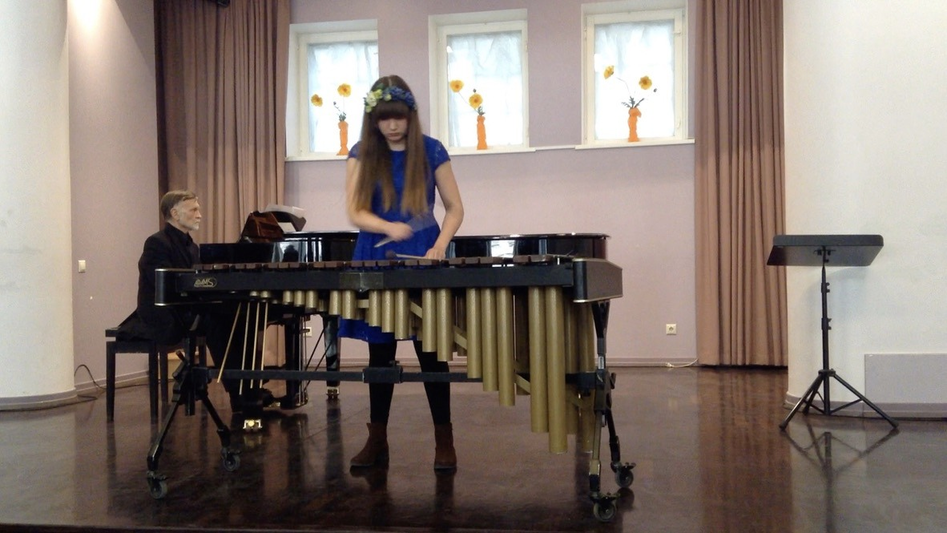Introducing the Artist-Researcher
I come from a mixed family of Latvian and Australian roots. Both of my parents have an education in economics and finance and both of my siblings are artists too. My brother is a professional contemporary dancer and my sister is a visual artist who specialises in animation and has been touring with her solo experimental electronic music with plant and mushroom synthesisers for 10 years. I grew up in a very supportive environment for artistic expression and encouragement to pursue a career as a musician.
I started playing music when I was 5 years old with a private piano teacher. At the age of 11 I enrolled in a state music school, but I didn't connect with the piano teacher I had there, so I switched to percussion. Around the same time I started attending a folk group, where children come together twice a week and play Latvian folk music in an ensemble and learn about the traditions, folklore and history of the Latvian and Baltic traditional rituals duringdifferent seasons of the year. The folk music teacher also gave individual lessons for learning an instrument and folk music repertoire. I learned the violin, but because of my previous training in music, the teacher took a minimalistic approach to teaching the violin and just provided the repertoire and let me explore the instrument on my own.
My background in traditional Latvian folk music has a strong presence in my artistic identity and artistic expression. A major part of the ensemble repertoire were songs that were sung acapella, sometimes with accompaniment of the Latvian stringed instrument kokle. Latvian folk music has a strong singing tradition teicēju dziedāšana (narrative singing) and one of the dominant elements of the music are the lyrics and the philosophy of the lyrics. (Tihovska, Šmite, Cepurniece, 2021).
At the age of 14, I decided I wanted to pursue music as a career, specifically folk music. Unfortunately, there were no folk music departments in Latvia's state schools. Instead, I enrolled into one of the most recognised Western Classical music specialised secondary schools in Latvia, to ensure my ability to pursue studies in the music academy. I played Western classical music as a percussionist for four intense years, which also included music literature lessons, where we learnt about composers and their artistic intentions and messages in music. This was one of my favourite subjects, because I discovered that music is more than just beautiful melodies, it is an art form with an important role in society. I started exploring composing and through my elder sister got involved in collaborations with visual artists.
When I was 16, I did my first collaboration with visual artist Ingrīda Pičukāne, who is a well established feminist visual artist in Latvia. We did multiple collaborations about relevant topics in Latvia from a feminist standpoint with live painting and live looping improvisations with percussion, kokle, violin and other instruments I play. This introduced me to the approach of art creation about societal topics. I was surrounded by the visual art community often and enjoyed the rebellious approach to art and continued to collaborate with visual artists, nowadays as well.
Through the visual art community I met Marianna Lapiņa, who started organising an experimental multidisciplinary arts festival in 2018 in the town of Ērgļi in Latvia. I was a participant for the first two years, assisting with certain areas of the organising and in 2020 I joined the organising team as the music curator. The festival takes place in the territory of Pārsteigumkalns hill and we encourage artists to create their artworks site-specifically and to collaborate with other art fields. The curators help build the connections for multidisciplinary collaboration amongst the 100 or more participants and provide support for the creation in the set terms and conditions. This has impacted my artistic identity strongly, as I feel like innovation and an experimental approach resonated with my values of art making.
I graduated from my NMV Emīla Dārziņa Music School specialised in Western classical music in Riga, Latvia and moved to Helsinki, Finland to pursue my studies in Global Music. Here I met many people from different countries, cultures and backgrounds. Each sharing their stories and their sorrows and experiences in their home countries and their struggles of starting a new life here in Helsinki. These interactions were extremely eye-opening for my view of the world. I could not imagine how big and wide our planet is and the struggles each individual has faced. No matter what they are, ranging from political, social to health, geographical, and economical challenges.
I grew more aware of the amount of societal issues and difficult emotions that are occuring every day on this planet. I constantly found myself disoriented of what to do with all that information, which at times was heavy. The world is not as rosy as I had imagined, the majority is struggling in some way and we are all navigating through that. At times I think that maybe the world is now hitting a point where there are more catastrophes, wars, and injustices happening than ever. It could also be that for the first time in human history, we have access to an enormous amount of information and reporting of what is happening in many places simultaneously.
I felt foolish that I was naive and unaware of the amount of hardships and sorrows that the world holds. I felt hopeless with finding strength to be an active listener and finding ways to help, because there are so many societal issues globally. The more I have learned about the world, about systems, about politics, the more I keep asking myself the question: How can we continue our individual paths and simultaneously support each other? What keeps us going as people? How can we maintain a sane relationship with an insane world?
Opening performance for Ingrīda's Pičukāne's exhibition "Sensual Medow" 2017
Photo by Tartu Kunstimaja / Tartu Art House
P



